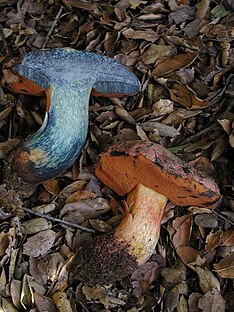Suillellus amygdalinus
| Suillellus amygdalinus | |
|---|---|
 |
|
| Scientific classification | |
| Kingdom: | Fungi |
| Division: | Basidiomycota |
| Class: | Agaricomycetes |
| Order: | Boletales |
| Family: | Boletaceae |
| Genus: | Suillellus |
| Species: | S. amygdalinus |
| Binomial name | |
|
Suillellus amygdalinus (Thiers) Vizzini, Simonini & Gelardi (2014) |
|
| Synonyms | |
|
|
| Suillellus amygdalinus | |
|---|---|
| Mycological characteristics | |
| pores on hymenium | |
| cap is convex | |
| hymenium is adnate | |
| stipe is bare | |
| spore print is olive-brown | |
| ecology is mycorrhizal | |
|
|
edibility: unknown or poisonous |
edibility: unknown
Suillellus amygdalinus (formerly Boletus amygdalinus) is a fungus of the bolete family found in western North America. The fruit bodies, or mushrooms, are characterized by their thick, red to brown caps, red pores, and the strong bluing reaction observed when the mushroom tissue is injured or cut. The cap can reach diameters of up to 10 cm (3.9 in) and the stipe 9 cm (3.5 in) long by 3 cm (1.2 in) thick at maturity. This mushroom has been found in manzanita and madrone woodlands of central California north to southern Oregon. Although the edibility of the mushroom is not known with certainty, it may be poisonous, and is not recommended for consumption. Other similar red-pored, bluing boletes from North America, including Rubroboletus eastwoodiae, Boletus luridiformis, and B. subvelutipes, can be distinguished from S. amygdalinus either by the color of the cap, the degree of reticulation (a network of raised ridges) on the stipe, or by location.
The species was first named Boletus puniceus by Harry D. Thiers in 1965, based on specimens he found in Napa County, California, on 23 November 1963. In 1975, Thiers changed the name to Boletus amygdalinus (a nomen nudum) as he discovered that the epithet had already been used for a different bolete found in Yunnan, China, published in 1948. The fungus was transferred to Suillellus in 2014 after molecular phylogenetics demonstrated that S. amygdalinus was in a lineage distinct from Boletus.
...
Wikipedia
